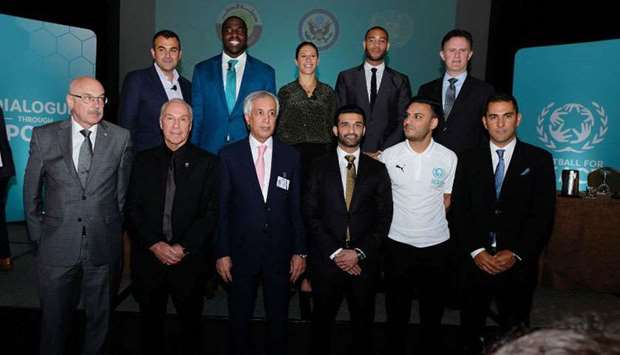Qatar has stressed the need to empower young people with life skills and values that would prevent them from engaging in violent extremism.
This came in a speech delivered by HE the Minister of State for Foreign Affairs Sultan bin Saad al-Muraikhi at the opening of a high-level event organised by Qatar’s Permanent Mission, in partnership with the United States, the United Nations Office of Counter-Terrorism, and Football for Peace Foundation, on the sidelines of the 74th session of the UN General Assembly, under the title "Promoting the Power of Sport to Prevent and Counter Violent Extremism".
HE al-Muraikhi said that Qatar is concerned about the impact of unresolved conflicts and poverty in many unstable and poor areas on the younger generation, where there is a limited employment opportunities and a lack of educational opportunities coupled with social, political and economic marginalisation, stressing the need to involve these young people and meet their needs. “These issues are of the utmost importance for Qatar.”
Qatar incorporates in its development programmes means to address social issues in line with the objectives of sustainable development, using various educational, professional and sports means, he added.
The minister noted Qatar Charity's sports initiative for peace and development in Darfur, pointing to schools that are funded by Qatar Fund for Development and Education Above All Foundation, where some of their programmes include sports facilities.
He expressed the pride of Qatar in hosting 2022 World Cup which “will be a catalyst for Qatar and the region to accelerate social progress and build a better future for future generations.”
For his part, Supreme Committee for Delivery & Legacy Secretary General Hassan al-Thawadi said that Qatar's hosting of 2022 FIFA World Cup for the first time in Arab world is an unprecedented opportunity for the youth and people of the region.
He said that Qatar is keen to see that this tournament benefits the whole region, referring to the launch of a number of different programmes and initiatives such as Challenge 22 and Generation Amazing programmes and Josoor Institute to empower Arab youth, ensure their participation in preparations for hosting the tournament and provide them with the opportunities and skills to build a better future for the region and the world at large.
At the event, Football for Peace Foundation presented the dialogue through sport initiative, which aims to strengthen the partnership on the basis of joint ventures, while seeking to host policy-makers and the private sector for dialogue on the role that sport and football can play as a power to prevent and combat violent extremism.
The participants reviewed ways to strengthen the partnership on the role that sport can play in promoting dialogue and understanding and building open and flexible societies. They also stressed that football is a global and cosmopolitan game that has the potential to strengthen links between people and individuals and to protect young people and their communities from harm.
The joint projects of Football for Peace, such as the Cites for Peace Programme, the Peace Matches and the Football Saves Lives were presented. It was stressed that sport is a very innovative area for the development of dialogue and partnership programs through close cooperation between governments and civil society organizations.
The event was attended by acting under secretary for Civilian Security, Democracy, and Human Rights Nathan Sales, under-secretary-general of the UN Office of Counter-Terrorism Vladimir Voronkov, Football for Peace co-founder Kashif Siddiqi, sport lawyer Erkut Sogut, AASC president Ahmed Nasser, and Ali Soufan from Soufan Center for security advisory.

